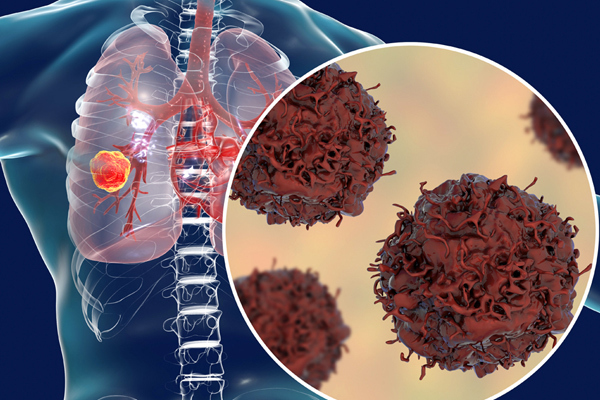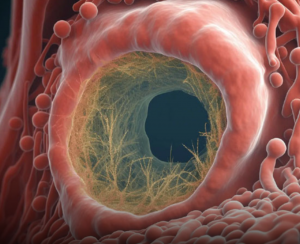
Top 3 Ways to Treat Tooth Decay with Guava Leaves – Simple and Cost-Effective
When people think of guava, they usually picture the sweet tropical fruit. But few realize that the leaves of the guava…

Today, we will use practical tips to help you recognize the warning signs of your body. Perhaps a small disease is silently growing inside you, and knowing it could save your life at a crucial time.

The “hidden nature” of early stage lung cancer is not chest pain but these 5 abnormalities:
Many people believe that lung cancer will cause sudden chest pain or shortness of breath in the early stages, like a heart attack. However, by the time these symptoms appear, it is often too late. The real early signs are hidden deep inside. You may experience them every day without thinking they are serious. Doctors have translated the five most common abnormalities into language that everyone can understand:
Persistent dry cough (not a cold, but a persistent cough)
Have you ever had a mild cough, no cold, no fever, that lasted more than three weeks? Data shows that about 40% of lung cancer patients initially present with a dry, unexplained cough. This is especially true when the cough is non-productive, the throat is not sore, and there is no fever. This subtle cough can easily be mistaken for the sound of spring air conditioning or a lingering cold.
But the lung tumor is actually irritating the lining of your airways, like a cat scratching at a door—itchy, but not intense. Cough medicine usually doesn’t help, and the condition can last up to two weeks. If you have a dry cough for more than two weeks, ask your doctor for a chest X-ray, such as a low-dose spiral CT scan; don’t rely on a regular X-ray to see everything at once.

Unexplained sleepiness, fatigue, and poor mental status
Some people suddenly find that no amount of sleep can relieve the fatigue that leaves them gasping for air after just a little housework or a short walk. They used to be able to cycle to and from work, but suddenly they have no energy. Even a full night’s sleep can leave them feeling completely exhausted. Medical research has found that persistent fatigue and low energy levels are typical “little warning signs” in patients with early-stage lung cancer.
This “hidden fatigue” can easily be mistaken for “ageing” or “recent stress,” but if it persists for several weeks, it should be taken seriously. Clinicians have seen many patients who only realize, after discovering the problem, that it wasn’t due to laziness or lack of sleep. The exhaustion caused by the tumor has begun to rob you of your energy and spirit.

Decreased appetite and unexplained weight loss
“I haven’t been eating much lately, and my stomach is a little uncomfortable. There must be something wrong.” Many people find that their appetite suddenly drops, they feel full after just a few bites, and they lose weight inexplicably. Then they think they’ve “successfully maintained their health and lost weight.”
In fact, tumors constantly consume energy and secrete special factors in the body, which can cause a person to lose weight continuously. A weight loss of more than 5% in three months, even without intentional weight loss, should raise concerns about the possibility of malignancy. 60% of lung cancer patients experience significant weight loss in the early stages of the disease. A middle-aged man who lost 12 pounds (about 5.5 kg) in six months was urged by his family to go to the doctor, but found out that he had early stage lung adenocarcinoma.

Persistent hoarseness or loss of voice, stuttering
Not all hoarseness is caused by a cold. Lung tumors can sometimes compress the laryngeal nerve, causing sudden hoarseness or even loss of the ability to speak, a weak, hoarse voice. A medical survey found that hoarseness is the first symptom in about 8% of lung cancer patients, but the condition is often attributed to “staying up late” or “throat problems.”
If you haven’t sung or used your voice excessively, and your voice sounds abnormal for more than two weeks, keep in mind that it could be a lung problem. A change in voice can actually indicate a problem with the “wires” in your lungs.
Persistent low-grade fever, night sweats, and occasional mild colds
Don’t confuse recurrent low-grade fever, afternoon heat, and night sweats with spring and autumn weather changes. Tumor-related fever can actually be detected in the early stages of lung cancer. Patients usually do not have a high fever, but a low-grade fever in the afternoon or at night, accompanied by frequent sweating and wet pillows. This is not a common viral infection, but the release of abnormal signaling molecules from the tumor, which disrupts the body’s immune system.
Some patients come to the hospital thinking they have not fully recovered, have to take antipyretics and have a fever again. Doctors recommend a chest X-ray if you have a low-grade fever and night sweats that recur for two weeks in a row. Don’t say “Just wait a few more days”, otherwise you may miss the opportunity to detect the disease.
In addition to the five major anomalies, these “small movements” should not be taken lightly:
In fact, some physical changes, such as enlarged fingertips and clubbing of the fingernails, have also been shown to be early signs of lung cancer. Unexplained shoulder and back pain that does not respond to pain medication is also a cause for concern.
Don’t rule out the risk for non-smokers. Data show that more women and non-smokers are still being targeted for early-stage lung cancer.

Missing early warning signs can lead to a different outcome – don’t wait until chest pain to take action
Some people are fooled by these “little changes” for six months, only to rush to the doctor when they have pain or cough up blood. By the time the diagnosis is confirmed, the cancer is in its mid- or late stages. The five-year survival rate for stage I lung cancer is more than 90 percent, but only by recognizing these subtle warning signs can you take proactive steps to prevent it.
So how can we achieve “early detection” in our everyday lives?
If a dry cough, low-grade fever, voice changes, or other abnormalities last longer than two weeks, ask your doctor for imaging instead of just taking medicine and waiting.
For people over 40 years old, those with long-term exposure to dust or those with a family history of cancer, low-dose CT scans of the lungs should be done annually, rather than waiting until they feel uncomfortable.
Sudden weight loss, weakness, and sudden changes in appetite are all warning signs. Don’t comfort yourself by saying, “It’s normal to get older.”
Even if you only practice one or two of these habits, knowing and being aware of them will help you reduce your risk more than other habits.

When people think of guava, they usually picture the sweet tropical fruit. But few realize that the leaves of the guava…

Precious medicinal plants grow in gardens without being planted and are beneficial to health in many ways. Few people know…

If you have polyps in your intestines, there will be 4 signs when going to the toilet, don’t wait until…

In the world of country rap and southern rock, Jelly Roll is more than just a musician—he’s a storyteller, a…

The World Health Organization (WHO), the World Heart Federation, and the American Heart Association estimate that heart failure (HF) is…

Tooth decay is one of the most common dental problems worldwide, causing pain, bad breath, and even tooth loss if…

Ingredients: 1 cup blueberries 🫐 1 mango, peeled and sliced 🥭 2 passionfruits, seeds scooped out 🍋…

Ingredients: For the Salmon: 2 salmon fillets 2 tablespoons honey 1 tablespoon Dijon mustard 1/2 teaspoon black pepper 1/2 teaspoon…

I moved to a broken-down farm I’d just inherited, hoping for peace. But when my neighbor copied my yellow fence,…

Ingredients For the Chili: 3 dried guajillo or New Mexico chiles 3 dried…

A hands-on bride, a tender mother’s tribute in something blue, and music drawn from a romantic first movie night came…

The ultra-wealthy are investing in cryogenic freezing, preserving their bodies at ultra-low temperatures with the hope that future science will…